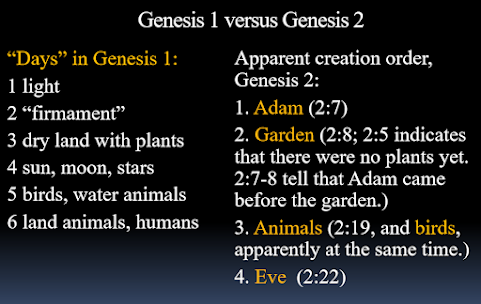This post is one in a series on the interpretation of Genesis 1 and 2.
Ezekiel 1:22 Over the head of the living
creature there was the likeness of an expanse, like the awesome crystal to
look on, stretched forth over their heads above. 1:23 Under the expanse were their
wings straight, the one toward the other: each one had two which covered
on this side, and every one had two which covered on that side, their
bodies. (All scripture from World English Bible, public domain, unless noted otherwise. Long quotes are in this color.)
The word translated as "expanse" is as follows, according to Strong's Concordance (See Wikipedia article on that resource) as shown in the Blueletter Bible:
Note that Strong gives two meanings for the Hebrew word rāqîa. The first is a "base, support," and the second is "regarded by the Hebrews as solid, and supporting 'waters' above it."
rāqîa is found in a number of passages in the Old Testament. It is translated as "firmament," "expanse," "surface," "platform" or "vault" in various translations, in Genesis 1:6; 1:6; 1:7; 1:8; 1:14; 1:14; 1:15; 1:17; 1:20, Job 37:18, Psalms 19:2; 150:1, Ezekiel 1:22; (3 times) 1:23; 1:25; 1:26 Daniel 12:3. "Expanse" is the most common, and it is often rendered "likeness of an expanse."
The graphic below is from the same source as the first one, and shows the concordance of Gesenius.
These two old authorities (Strong and Gesenius) believed that the firmament, or expanse, was a physical structure, over the earth, and that the stars were fixed in that expanse, and that that expanse supported reservoirs of water, just as the ancient Jews believed.
Here are some more Biblical uses of the word, rāqîa:
Genesis 1:6 God said, “Let there be an expanse in the middle of the waters, and let it divide the waters from the waters.” 7 God made the expanse, and divided the waters which were under the expanse from the waters which were above the expanse; and it was so. 8 God called the expanse “sky”. There was evening and there was morning, a second day.” The King James Version, and some others, use "firmament,"
rather than "expanse." "Expanse" is used more often than "firmament."
One version uses "arch." The NIV uses "vault." (See here for over a dozen translations of Genesis 1:6.)
Job 37:18 Can you, with him, spread out the sky, which is strong as a cast metal mirror? [This verse supports the idea of a solid dome.]
Psalm 19:1 The heavens declare the glory of God. The expanse shows his handiwork.
Psalm 150:1 Praise Yah! Praise God in his sanctuary! Praise him in his heavens for his acts of power!
Ezekiel 1:22 Over the head of the living creature there was the likeness of an expanse, like an awesome crystal to look at, stretched out over their heads above. 23 Under the expanse, their wings were straight, one toward the other. Each one had two which covered on this side, and each one had two which covered their bodies on that side. 24 When they went, I heard the noise of their wings like the noise of great waters, like the voice of the Almighty, a noise of tumult like the noise of an army. When they stood, they let down their wings.25 There was a voice above the expanse that was over their heads. When they stood, they let down their wings. 26 Above the expanse that was over their heads was the likeness of a throne, as the appearance of a sapphire stone. On the likeness of the throne was a likeness as the appearance of a man on it above.
Daniel 12:3 Those who are wise will shine as the brightness of the expanse. Those who turn many to righteousness will shine as the stars forever and ever.
There are also Genesis 7:11 In the six hundredth year of Noah’s life, in the second month, on the seventeenth day of the month, on that day all the fountains of the great deep burst open, and the sky’s windows opened. ["windows opened" suggests a belief in a solid dome.]
and Job 22:12 “Isn’t God in the heights of heaven? See the height of the stars, how high they are! 13 You say, ‘What does God know? Can he judge through the thick darkness? 14 Thick clouds are a covering to him, so that he doesn’t see. He walks on the vault of the sky.’ [Walking on a vault suggests that the vault is solid.]
Since
I was going to write on the firmament/expanse/vault/arch, I thought I
should see what AiG, the most important young-earth
creationism organization, had to say about it. Here's part of that:
Critics of the Bible have often said that the writings of Genesis
reflect an “unscientific view” of the universe—one that reflected the
cosmology of the ancient world. One of these criticisms centers on the
Hebrew word raqia used in the creation account of Genesis 1. (Guy Vaterlaus, "Underneath a Solid Sky," Answers in Genesis, August 8, 2023. Also published earlier on March 9, 2009.)
And,
from the same post: "The argument from these Bible critics is that the
ancient Hebrews believed in a solid dome with the stars embedded in the
dome." Vaterlaus strongly implies that the ancient Hebrews didn't
believe in a solid dome, holding up the heavenly bodies.
"Critics
of the Bible" sounds like an important idea. But, what it really means,
to Answers in Genesis, is "critics of the Answers in Genesis
interpretation of the Bible." See the Answers in Genesis Statement of Faith, which includes the following:
- The account of origins presented in Genesis 1–11 is a simple but
factual presentation of actual events, and therefore, provides a
reliable framework for scientific research into the question of the
origin and history of life, mankind, the earth, and the universe. ...
- The great flood of Genesis was an actual historic event, worldwide
(global) in its extent and catastrophic in its effects. ...
- Scripture teaches a recent origin of man and the whole creation, with history spanning approximately 4,000 years from creation to Christ.
In spite of the scriptural and historical evidence, AiG maintains that people of Bible times didn't believe in some sort of dome over the earth, holding up the clouds and heavenly bodies. Here's an article on the subject, from AiG. The title says it: ""Is the Raqiya‘ (‘Firmament’) a Solid Dome?" The answer, is "no."
Another article on the subject, from AiG, says The argument from these Bible critics is that the ancient Hebrews believed in a solid dome with the stars embedded in the dome. They say that the word firmament reflects the idea of firmness, and this reflects erroneous cosmology. Therefore, the Bible is not the inspired Word of God, and we don’t need to listen to its teaching.
AiG may be correct about some Bible critics and what they say about the Bible. But I doubt that many such base their criticism primarily on the idea of a solid dome above the earth. AiG is not correct in saying that statements in the Bible about scientific subjects, like cosmology, have to match our current knowledge, or, if they don't, the Bible is deeply discredited. I have posted here about ancient understanding of the function of the liver, and here, about the size of mustard seeds, and about how the sun's position relative to the earth is described. In these cases, the Bible reports something that was said, or believed, and was wrong scientifically. But that doesn't make the Bible wrong, anymore than reporting on some wacky idea, without arguing for its truth, would discredit CNN's reporting.
The Bible does not teach, as a doctrine to be defended, that there was a solid dome above the earth. But it does describe the situation as the ancient Jews believed it -- they thought there was such a firmament. If anything, that makes the Bible more believable.
Thank you for reading.










